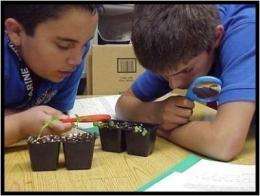Students learn environmental stewardship, improve science scores

Keeping with the global "green" trend, educators worldwide are relying more on environmental education lessons to enhance students' science knowledge. Studies have revealed that bringing environmental education into the curriculum raises not just science scores—environmental-based lessons can also improve student test scores in other subject areas. Naturally, educators are interested in developing new ways to integrate these relevant lessons into the classroom in hopes of piquing student interest and comprehension in multiple subject areas.
To accompany an established program called "Coastal Roots", educators in Louisiana recently designed and tested eight hands-on horticulture lessons to teach middle school students the basic needs, processes, and benefits of plants. Students who received the horticulture lessons were tested on science content and "environmental awareness". Significant increases in student post-test scores were found in both years of the study.
In 1999, The Louisiana Sea Grant College Program established ''Coastal Roots'' an innovative program designed to teach information on Louisiana's wetland loss and foster stewardship for the state's coastal resources in elementary through high school students. The program combines nursery management and coastal environmental awareness into a hands-on program in which students at participating schools grow coastal plants for use in local wetland restoration projects.
To compliment the nursery-based Coastal Roots program, the researchers designed eight hands-on lessons that take basic horticulture knowledge a step forward by introducing the importance of plants to Louisiana's wetlands. Kathryn Karsh, Edward Bush, Janice Hinson, and Pamela Blanchard from Louisiana State University published the study report in HortTechnology.
Four Louisiana schools participated in the LSU study. The schools were chosen from those participating in the Coastal Roots program, and included one private and three public schools in four southern central parishes (counties). Students were tested on science content in the lessons using a pre-test, eight multiple choice quizzes (each focusing on a particular lesson), and a post-test. An "attitudes toward the environment scale'' test was administered to evaluate students' environmental awareness changes in the treatment and control groups.
Students who received the horticulture lessons improved their post-test scores by 11.4 points in the first year and an impressive 25.07 points in the second year of the study. In the second year, students who received the lessons were more found to be significantly more "aware of their role in the environment" than those who did not receive the additional lessons.
Karsh, lead author of the study, noted that "the study proved that that the addition of the horticulture lessons statistically improved student post-horticulture scores and environmental stewardship as determined by the horticulture test and test scores."
More information: The complete study and abstract are available on the ASHS HortTechnology electronic journal web site: horttech.ashspublications.org/ … nt/abstract/19/4/813
Source: American Society for Horticultural Science

















